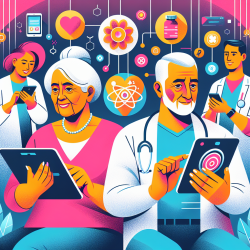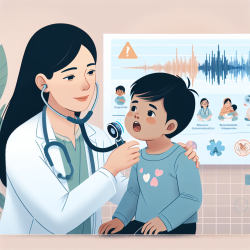Introduction
As practitioners, we are continually seeking ways to enhance the quality of care we provide to our patients. A recent study titled "Tailored Self-Management App to Support Older Adults With Cancer and Multimorbidity: Development and Usability Testing" offers valuable insights into how digital health tools can be leveraged to support older adults in managing their health more effectively. This blog explores the key findings of the study and how practitioners can implement these insights to improve patient care.
Understanding the Research
The study utilized Grey’s self-management framework and a design thinking approach to develop a self-management app tailored for older adults with cancer and multimorbidity. The research involved co-designing the app with older adults and caregivers, ensuring that the tool was user-friendly and addressed the specific needs of this demographic. The app's features included tracking functions for physical symptoms, psychosocial aspects, medication reminders, and communication tools for healthcare providers.
Key Outcomes and Implications for Practitioners
The study's findings highlight several key outcomes that can be instrumental for practitioners:
- Empowerment through Tracking: The app's tracking features enable older adults to manage their symptoms and medication schedules actively. Practitioners can encourage patients to use similar tools to enhance their engagement in their care.
- Improved Communication: The app facilitates better communication between patients and healthcare providers by organizing notes and reminders. Practitioners can adopt this approach to streamline patient-provider interactions and ensure continuity of care.
- Tailored Interventions: By incorporating patient feedback into the design, the app is tailored to meet the unique needs of older adults with cancer and multimorbidity. Practitioners should consider patient-centric approaches in developing interventions to improve adherence and outcomes.
Encouraging Further Research and Implementation
The study underscores the importance of involving patients in the design and evaluation of digital health tools. Practitioners are encouraged to engage in further research to explore how such tools can be integrated into routine care. Additionally, there is a need to assess the long-term impact of these tools on patient outcomes and healthcare delivery.
Conclusion
The development and usability testing of the self-management app represent a significant step forward in supporting older adults with cancer and multimorbidity. By leveraging technology, practitioners can empower patients to take an active role in managing their health, ultimately improving their quality of life. For those interested in delving deeper into the study, the original research paper can be accessed through the following link: Tailored Self-Management App to Support Older Adults With Cancer and Multimorbidity: Development and Usability Testing.










